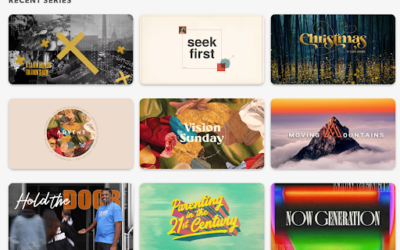With the explosion of AI tools, the church must decide how to fuse technology with faith without compromising the Gospel. In this article, we will present a balance of five ways churches can use AI and three ways they shouldn’t.
AI Virtual Assistant
The term AI virtual assistant does not refer to a robot designed to replace the person who manages your office. An AI virtual assistant is any tool that automates a process you would otherwise have to do manually. In other words, it is just about every technological tool available, from Alexa, to Google Maps, to Zoho.
Churches can use AI virtual assistants to accept payments, schedule and transcribe meetings, send event updates, and more.
I found a sweet list of AI tools on https://www.aitoolnet.com/.
Brainstorm Partner
AI is a fantastic brainstorming partner. Many of us work at home alone, which can feel a bit lonesome when there is no one with whom to process ideas. While AI is not a substitute for your colleagues, it is much better than clawing your way through brain block alone, and you will never have to endure Bard’s mother-in-law stories.
Church staff can use AI as a brainstorming partner for church event planning, content creation, and Sunday School ideas.
Research Assistant
AI can save countless research hours because it knows how to scan and summarize the web. For many of us, half the battle is defining the search parameters. As much as I love research, my greatest struggle is figuring out what keywords will get the results I need. I’ll skim three articles before I realize I need to try a different keyword, so I’ll refine my search, skim three more articles, and refine again. Two hours later, I’m dizzy, and I have more notes than I know what to do with.
AI search tools use the keywords you provide to generate search query results. With manual keyword research, every search term is a fresh start, but subsequent prompts to an AI search tool act like a filter. The system remembers your sequence and uses your follow up prompts as clarification. This means your search results are refined, and the output is more concise with each prompt.
Pastors can use AI research to find historical data and current events to incorporate into sermons, to look up scripture lists, or to help with word studies.

Google Bard
Bard is Google’s user-friendly, free chatbot assistant designed to rival Chat GPT. It has a clean design with just the perfect features to help pastors and ministry leaders brainstorm ideas and get inspired.
Church pastors can use Bard AI to help with sermon titles and with leveraging the Google Ad Grant to reach a wider audience. We use AI tools to find both information and inspiration, to save you time and energy, and help you use more of the grant to reach more people with the Gospel.
I asked Bard how it can help a pastor write a sermon. Then, I asked for an outline for a sermon four-week series about Pentecost. Bard gave me detailed, organized ideas, complete with Scripture references, an outline, and applications. Then, I asked Bard to expand on the week 1 idea, and it fleshed the content out more. At each level, the replies became more specific and actionable.
I also found helpful features. When I clicked the little pencil to the side of my prompt, it allowed me to edit the wording, which was very helpful to help me hone in on the right wording. I also love the additional draft versions. Just click on a different draft, and the full text will populate below, even as the original draft remains available in the top row. And if you don’t care for any of the first three drafts, just click the “regenerate” button on the far right.

There are five icons under the output to engage further with the content. Thumbs-up and thumbs-down buttons allow you to give Bard feedback to improve its responses. A settings menu provides options to adjust the length and formality of the response. The Share icon allows you to share your chat with a team member using a link, via email, or to upload it to a Google Doc. The last icon allows you to copy the response. But the real fun is in the fourth icon.
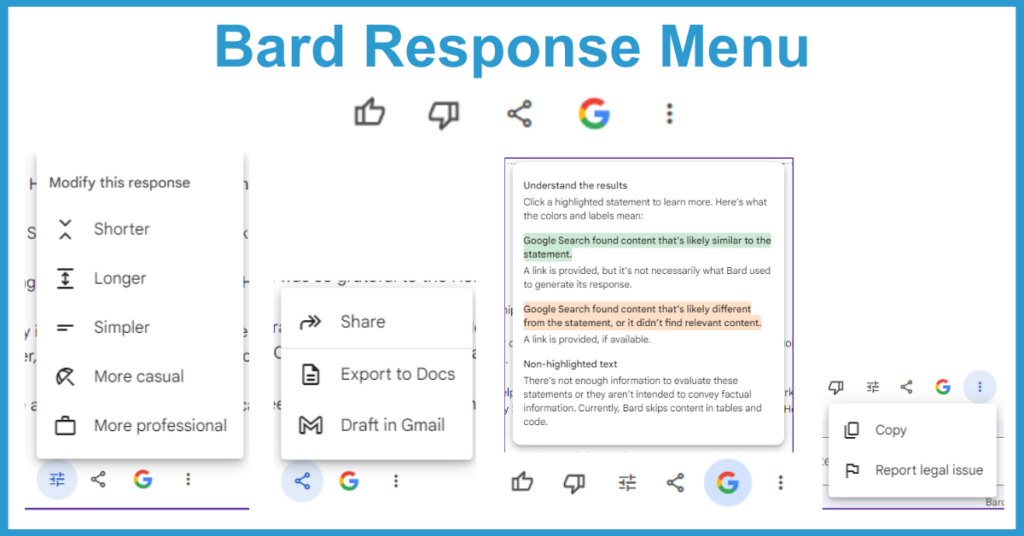
The Google icon is Bard’s Double-Check Response Results option. When you click it, Bard will take a few seconds to analyze the results and highlight certain pieces of text in either green or orange. Orange indicates the source could not be verified. I commend Google for calling out where content may be inaccurate so you can do your homework. When you click on text highlighted green, it gives you a link directly to the source, which is an absolute blessing for researchers!
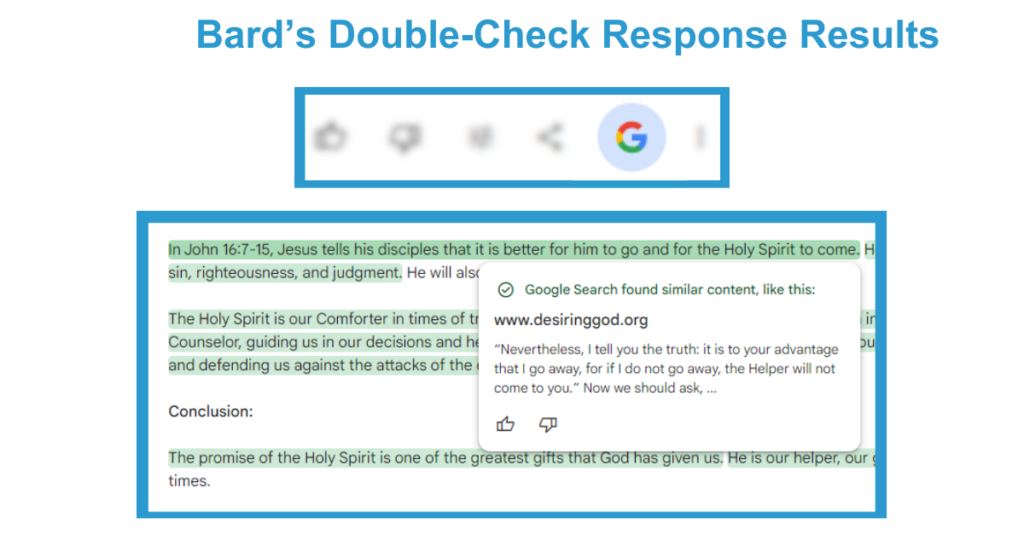
Use AI as a Content Summarizer
The hard part about repurposing sermons to social media is writing the summaries and blurbs, but now AI can help. Copy and paste the long form content into ChatGPT and prompt it to give you a summary of your desired length. You can also use summarize.tech to generate an overview and a section-by-section summary of any YouTube video. This is helpful both for writing blurbs, social media posts, and for research. I asked it to summarize one of my favorite interviews, The immense weight of playing Jesus, with Dallas Jenkins and Jonathan Roumie from “The Chosen,” and it was spot-on!
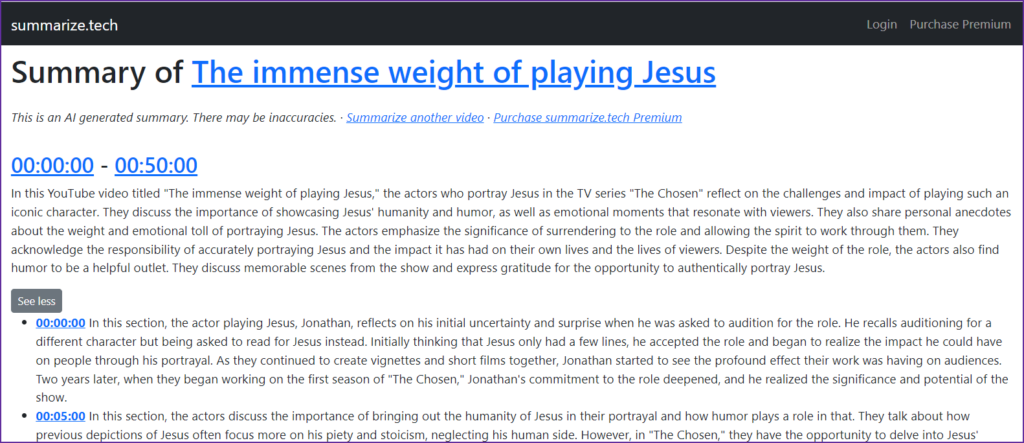
3 Ways Churches Should Not Use AI
AI pulls from search engines, and Google isn’t gospel. While people seemed to think AI would take over the world, the truth is Jesus already has. As Christians, we must use AI with wisdom, and limit our use with discernment.
The Lord speaks to you, not to AI. The Lord can speak to you through AI, but you still must make sure He’s there with you. Use AI with Jesus through prayer.
Don’t Use AI Off the Shelf
Don’t take AI output as is. Read it carefully, do a thorough fact-check, and edit. Think of AI output as a brain dump, or rough draft, never as a plug-and-play.

Don’t Present AI as Truth
AI learns from the internet, and the internet did not come from Truth, so even as a biblical research assistant, AI is not the Word of God. God’s vessel is His people, not His peoples’ toys.
Anything you get from AI, put it through the lens of Scripture and prayer. Never present AI content as the Word of the Lord.
Don’t Substitute AI for Human Connection
During my research for this article, I found several sources suggesting the use of chat bots to minister to people after-hours to provide 24/7 “pastoral access.”
Um, no..
Any way that Jesus speaks directly to your heart—AI can’t.
AI will never provide pastoral access because a pastor’s job is to connect with people as a representative of Jesus. Pastoral access means empathy, understanding, and connection. Only an imperfect human being can speak to another person’s pain, and that’s where Jesus is. He is near to the brokenhearted. He meets us in our pain to give us healing and hope.
Jesus is our Savior, not AI, so a chat bot should only be used to provide information that is otherwise already on your website, such as times, places, and events.
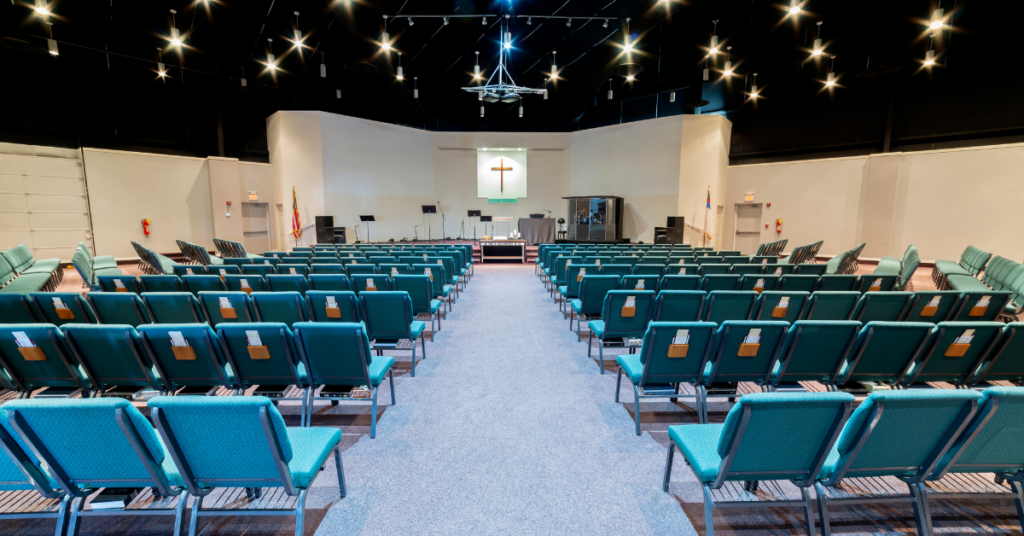
Conclusion
AI is an amazing tool that can help people proclaim the Gospel. As the church explores how to use AI, I recommend asking yourself if the tool can give you more time with either Jesus or His people.
At Click Nonprofit, we are here to amplify the impact of churches and nonprofits through digital marketing. We are learning about AI along with you, and we look forward to finding exciting ways to help you reach more people with the Gospel through the Google Ad Grant. We’d love to hear from you if you’d like to learn more.




